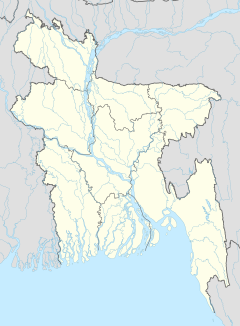Chuknagar massacre
| Chuknagar Genocide | |
|---|---|
| Native name | চুকনগর গণহত্যা |
| Location | Chuknagar, Khulna, East Pakistan (now Bangladesh) |
| Date | 20 May 1971 (UTC+6:00) |
| Target | Bengali Hindus[1] |
Attack type | Burst fire, mass murder, genocidal massacre, ethnic cleansing |
| Weapons | Light machine guns, semi-automatic rifles |
| Deaths | 10,000 - 12,000[1] |
| Perpetrators | Pakistan Army, Razakars |
| Motive | Anti-Hindu sentiment, racism |
Chuknagar massacre (Bengali: চুকনগর গণহত্যা) was a massacre of Bengali Hindus committed by the Pakistan Army and local Razakars during the Bangladesh Liberation War in 1971.[1] The massacre took place on 20 May 1971 at Dumuria in Khulna[2] and it was one of the largest massacres during the war.[3] According to local estimates, between 10,000 and 12,000 people were killed, though the exact number of persons killed in the massacre is not known.[1] Academic Sarmila Bose, in her controversial book.[4] dismisses claims that 10,000 were killed as "unhelpful", and argues that the reported number of attackers could have shot no more than several hundred people before running out of ammunition.[5] The majority of people killed in the massacre were men, although an unknown number of women and children were murdered as well.[6]
Massacre
[edit]Chuknagar is a small town at Dumuria of Khulna, adjacent to the Indian border. After the Pakistan military launched a military campaign called Operation Searchlight, many people of Bengali Hindu community started fleeing from Khulna and Bagerhat. They crossed Bhadra River and arrived at Chuknagar to cross the Indian border using Satkhira Road. By 15 May 1971 large numbers of refugees from nearby localities gathered at Chuknagar, as rumors broke out of an impending Pakistani attack. On 20 May, around 10:00, a group of Pakistani military personnel equipped with semi-automatic rifles and light machine guns came on around three trucks. They stopped at a place called Jhautala (then known as Pathkhola) at the left corner of the Chuknagar Bazaar. Then they opened fire on the Pathkhola grounds and later moved to Chuknagar Bazaar and continued firing until 15:00.[citation needed]
Many people drowned as they jumped into the river in a largely futile attempt to flee the carnage. Local people later disposed off the dead bodies by throwing them into the river.[6]
Memorial
[edit]
A memorial was built to pay homage to the people who died in the massacre. The memorial is called Chuknagar Shohid Smritishoudho or Chuknagar martyred memorial.[2]
See also
[edit]References
[edit]- ^ a b c d "Recognize Chuknagar Genocide, demand activists". Dhaka Tribune. 21 May 2022. Retrieved 10 December 2022.
- ^ a b Rahman, Md Mujibur (20 May 2013), ২০ মে চুকনগর গণহত্যা দিবস [20 May Chuknagar Day Massacre], The Daily Janakantha (in Bengali), archived from the original on 4 March 2016, retrieved 15 October 2015
- ^ "Chuknagar genocide day observed", New Age, p. 11, 21 May 2006, archived from the original on 23 October 2007
- ^ Lawson, Alastair (16 June 2011). "Controversial book accuses Bengalis of 1971 war crimes". BBC. Retrieved 30 December 2013.
- ^ Sarmila Bose (2011), Dead Reckoning: Memories of the 1971 Bangladesh War, London: Hurst and Co, p. 124, ISBN 978-1-84904-049-5
- ^ a b Sarmila Bose (2011), Dead Reckoning: Memories of the 1971 Bangladesh War, London: Hurst and Co, pp. 119–122, ISBN 978-1-84904-049-5
Further reading
[edit]- Tripathi, Salil (2016). The Colonel Who Would Not Repent: The Bangladesh War and Its Unquiet Legacy. Yale University Press. pp. 118–124. ISBN 978-0-300-21818-3.
